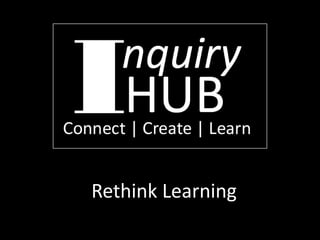
Inquiry Hub - Rethink Learning
- 2. Information Session AGENDA Introductions What is inquiry learning? Who is the Inquiry Hub for? CONNECT Technology, Blogs, Mentorship Mr. Sarte – Portfolios Hanna – A ‘Typical’ Day Owen – An Inquiry Project CREATE Authenticity & Purpose Rethink Learning Shauna – Our Garden LEARN Competencies Mr. Soiseth – Self-Regulation ‘Requisite’ Courses QUESTIONS TOUR http://inquiryhub.org January 22nd, 2013
- 3. Introductions Vice Principal and Lead Administrator: David Truss District Principal: Sarah Husband Inquiry Hub Teachers: Mr.Soiseth & Mr. Sarte Inquiry Hub Students: Hannah, Owen, Shauna, Sophia and Wilson. District Manager of Information Services: Stephen Whiffin
- 4. What is inquiry learning?
- 5. Inquiry learning is ‘active’ learning… Student driven Students are provided an opportunity explore and question on their own (and also with the facilitation of a teacher). Creating good questions and coming up with thoughtful, rich and compelling answers.
- 6. Inquiry learning is ‘active’ learning… Student driven Students are provided an opportunity explore and question on their own (and also with the facilitation of a teacher). Creating good questions and coming up with thoughtful, rich and compelling answers.
- 7. Inquiry learning is ‘active’ learning… Student driven Students are provided an opportunity explore and question on their own (and also with the facilitation of a teacher). Creating good questions and coming up with thoughtful, rich and compelling answers.
- 8. Vision (7 Aspects) The 7 Ways images above are from iStockphoto except for: ‘Voice’ - Neon Mic by fensterbme on flickr, and ‘Play’ by David Truss
- 16. Who is the Inquiry Hub for? Passionate Learners who: Want to apply learning in a practical way Are interested in learning with technology Find structured classes do not meet their learning needs Are interested in learning through social networks Desire to work on projects that make a difference
- 17. Who is the Inquiry Hub for? Passionate Learners who: Want to apply learning in a practical way Are interested in learning with technology Find structured classes do not meet their learning needs Are interested in learning through social networks Desire to work on projects that make a difference
- 18. So what does it look like?
- 19. So what does it look like? Every student chooses a theme area: • Community and Global Issues • Environmental Sustainability • Media art, design and technology Exploring problems and projects of interest Working with teacher mentors to connect learning to curriculum
- 20. So what does it look like? Topical workshops instead of daily classes Use of extensive online learning resources Flexible assessment which allows for a variety of ways to represent learning Small school, learning commons environment
- 21. Inquiry Hub – in action… Connect People Create Solutions to problems Learn Competencies for the 21st century
- 22. Rethink learning: Part 1 CONNECT
- 23. Technology – Bring Your Own Laptops
- 24. Blogs
- 25. Mentorship Community Mentors Parent Mentors Peer Mentors Teacher Mentors
- 27. A ‘typical’ day Hannah
- 30. Learning spaces Learning Lab
- 31. Learning online Online courses - Setting goals - Self motivation - Working with others - Share work in our portfolio - Conferencing with teachers
- 32. Afternoon Inquiry Time Students choose their own topics
- 33. An Inquiry Owen
- 35. How does music affect people’s ability to drive in a racing game?
- 38. Rethink learning: Part 2 CREATE
- 39. Creation of Inquiry tackling real-world questions, issues and controversies developing questioning, research and communication skills solving problems or creating solutions collaborating within and beyond the classroom developing deep understanding of content knowledge participating in the public creation and improvement of ideas and knowledge
- 40. Creation of Inquiry tackling real-world questions, issues and controversies developing questioning, research and communication skills solving problems or creating solutions collaborating within and beyond the classroom developing deep understanding of content knowledge participating in the public creation and improvement of ideas and knowledge
- 41. Real Products "It is no longer enough to do powerful work if no one sees it.“ Chris Lehmann http://www.flickr.com/photos/alpha600/4248729223/ Àodìlì / 奥地利 By α
- 42. Real Products Chris Lehmann d http://www.youtube.com/watch?v=q08jz7xEp00 Science Leadership Academy, Philadelp hia Bio-diesel engine patent
- 43. Real Products SCIL, Australia SCIL: http://vimeo.com/28510394 Virtual Art Gallery
- 44. Real Products Shauna http://www.tricitynews.com/community/187374351.html
- 45. Inquiry $5,000 Grant New inquiries emerge!
- 47. Rethink learning: Part 3 LEARN
- 48. Developing Competencies Moving beyond outcomes to core competencies Seven C’s of 21st Century Learning • critical thinking • creativity and innovation • collaboration • cross-cultural understanding • communication • computing technology • career learning Source: 21st Century Skills: Learning for Life in Our Times (Trilling and Fadel, 2009)
- 49. Self-Regulation Mr. Soiseth
- 50. ‘Requisite’ Courses Foundations of Inquiry Applications of Digital Literacy - Building the skills to be successful (Not just expecting students to have them)
- 51. Questions?
- 52. Tour Guides Owen Sophia Hannah Shauna Wilson
- 53. http://inquiryhub.org Info. Session & Brochure Inquiry Hub on Facebook Inquiry Hub on Twitter Coquitlam Open Learning SD43 Coquitlam
